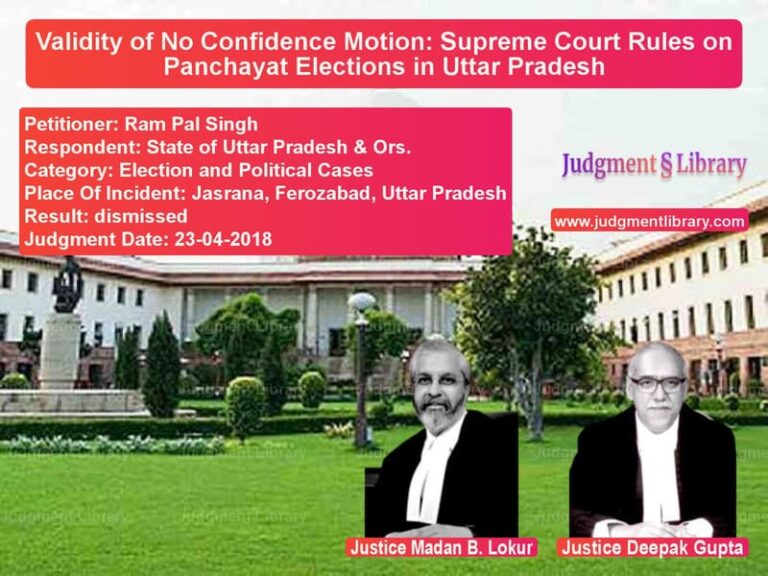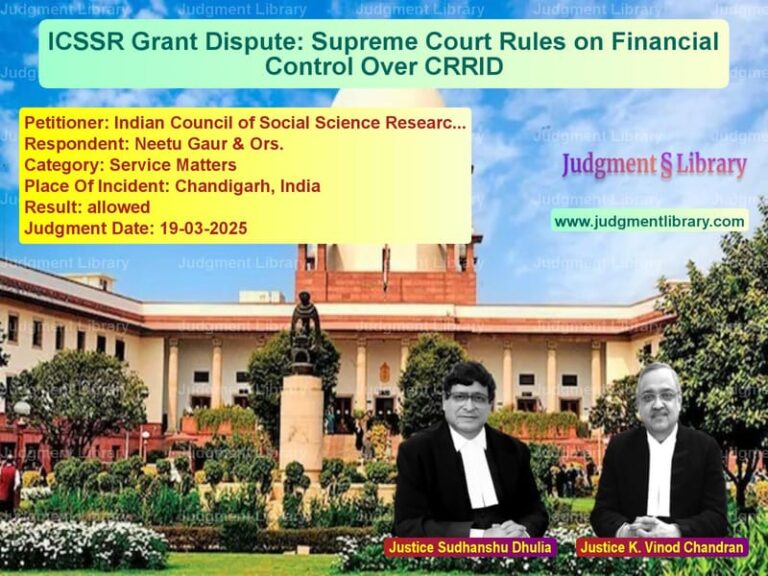Supreme Court Resolves Longstanding Electricity Tariff Dispute in Odisha
The Supreme Court of India has delivered a significant judgment in the longstanding electricity tariff dispute involving GRIDCO Ltd., the bulk supplier of power in Odisha, and various distribution companies (DISCOMS). The case primarily revolved around the determination of the Bulk Supply Tariff (BST) and Annual Revenue Requirement (ARR) by the Orissa Electricity Regulatory Commission (OERC). The Supreme Court’s ruling provides clarity on tariff determination, regulatory oversight, and the responsibilities of power distribution companies.
Background of the Case
The dispute originated from multiple appeals arising from tariff orders passed by the OERC, which were subsequently challenged before the Appellate Tribunal for Electricity. The core issue was the fixing of ARR and BST for different financial years, particularly 2006-2007 and 2007-2008. The primary entities involved in this case were:
- GRIDCO Ltd. – A government-owned entity responsible for bulk electricity supply in Odisha.
- DISCOMS – Four distribution companies, namely Western Electricity Supply Company (WESCO), North Eastern Electricity Supply Company (NESCO), Southern Electricity Supply Company (SESCO), and Central Electricity Supply Company (CESCO), which distribute electricity to consumers.
- Orissa Power Transmission Corporation Ltd. (OPTCL) – The state transmission utility responsible for the transmission of electricity.
- Orissa Electricity Regulatory Commission (OERC) – The regulatory authority responsible for setting tariffs and overseeing power distribution operations.
Key Issues in the Case
1. Locus Standi of DISCOMS in Challenging BST
GRIDCO argued that the DISCOMS had no standing to challenge the BST as any increase in BST was reflected in the Retail Supply Tariff (RST), which allowed them to pass on costs to consumers. However, the Supreme Court rejected this argument, holding that DISCOMS had the right to challenge BST since it directly impacted their financial viability. The Court ruled:
“The DISCOMS are directly affected by the BST determinations and have the legal standing to contest them before the appropriate forum.”
2. Repayment of Principal Loan Amount
GRIDCO sought to include Rs. 480 crores in BST to cover the repayment of its principal loan amount. The Supreme Court ruled that while interest on loans could be considered a legitimate cost in ARR, the principal amount could not be passed through as a tariff component, as it would amount to double recovery.
The judgment stated:
“Allowing the principal loan amount to be included in the ARR would burden consumers unjustly, as these costs have already been factored into past financial calculations.”
3. Consideration of Surplus Power Revenue
One of the most contested issues was whether revenue from the sale of surplus power should be included in ARR. The Supreme Court emphasized that GRIDCO’s revenue from surplus power sales must be accounted for in tariff determination. The OERC had excluded Rs. 943 crores earned from power exports, which the Supreme Court found erroneous. It directed regulatory authorities to factor in such revenues while setting tariffs.
“Revenue generated from power exports should be used to reduce the overall burden on consumers rather than being excluded from ARR calculations.”
4. Truing-Up Exercise
The Supreme Court found that the OERC had failed to conduct proper truing-up exercises for previous years, leading to inaccurate tariff calculations. It ordered a retrospective truing-up of past years’ accounts to correct anomalies.
The Court observed:
“The regulatory body must ensure periodic truing-up to maintain transparency and fairness in tariff calculations.”
5. Determination of Transmission Tariff
OPTCL’s transmission charges were contested by DISCOMS, who argued that the rates were unjustifiably high. The Supreme Court upheld the Appellate Tribunal’s decision to allow reasonable repair and maintenance expenses while disallowing certain excessive charges.
6. Employees’ Costs and Other Operational Expenses
The Court held that DISCOMS were entitled to recover legitimate employee costs, including terminal benefits and administrative expenses. It directed the OERC to reassess these costs fairly, ensuring that they were aligned with actual expenditures.
“Employees’ benefits are essential for the sustainability of power distribution companies and must be accounted for in a transparent manner.”
Supreme Court’s Final Orders
- DISCOMS were allowed to challenge BST orders.
- Repayment of the principal loan amount was disallowed as a tariff component.
- Revenue from surplus power sales must be accounted for in tariff calculations.
- A retrospective truing-up exercise was mandated.
- Employee costs and administrative expenses were to be reassessed.
- The OERC was directed to implement the judgment’s findings within a specified timeframe.
Impact of the Judgment
This judgment has significant implications for electricity regulation in India. It reinforces the need for transparent tariff determination and ensures that distribution companies are not unfairly burdened by financial miscalculations. The ruling serves as a guideline for regulatory commissions across the country, emphasizing:
- The necessity of regular truing-up exercises.
- The importance of considering surplus revenue in tariff calculations.
- The prohibition of passing loan principal repayments as consumer charges.
- The obligation to ensure a fair distribution of transmission costs.
Conclusion
The Supreme Court’s ruling in this case brings clarity to electricity tariff determination in Odisha and sets a precedent for similar disputes across the country. By emphasizing regulatory fairness, financial accountability, and consumer protection, the judgment ensures that electricity pricing remains transparent and justified.
Petitioner Name: GRIDCO Ltd..Respondent Name: Western Electricity Supply Company of Orissa Ltd. & Others.Judgment By: Justice Sanjay Kishan Kaul, Justice Abhay S. Oka.Place Of Incident: Odisha.Judgment Date: 05-10-2023.
Don’t miss out on the full details! Download the complete judgment in PDF format below and gain valuable insights instantly!
Download Judgment: gridco-ltd.-vs-western-electricity-supreme-court-of-india-judgment-dated-05-10-2023.pdf
Directly Download Judgment: Directly download this Judgment
See all petitions in Corporate Compliance
See all petitions in Contract Disputes
See all petitions in Consumer Rights
See all petitions in unfair trade practices
See all petitions in Legal Malpractice
See all petitions in Judgment by Sanjay Kishan Kaul
See all petitions in Judgment by Abhay S. Oka
See all petitions in partially allowed
See all petitions in Modified
See all petitions in supreme court of India judgments October 2023
See all petitions in 2023 judgments
See all posts in Corporate and Commercial Cases Category
See all allowed petitions in Corporate and Commercial Cases Category
See all Dismissed petitions in Corporate and Commercial Cases Category
See all partially allowed petitions in Corporate and Commercial Cases Category







